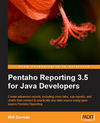Google’s Summer of Code
Google has selected Pentaho to be one of the many Summer of Code mentoring organizations for 2008. We have a long list of fun projects that folks can participate in. I’ve volunteered to be one of our project mentors, and have come up with a few projects that might interest developers who are new to the BI world and want to get their feet wet. Here is a high level list of project ideas that I’d love to see accomplished, all within the scope of Pentaho Metadata:
Add Publishing of OLAP Models to Pentaho’s BI Platform - In Pentaho’s Metadata Editor, there is a lesser known OLAP Schema Designer, which Matt Casters wrote a while back. Eventually, we see this as the primary place where warehouse designers will build and manage Mondrian ROLAP schemas. Being able to easily publish to Pentaho’s BI Platform, like we already do with Metadata XMI files, will make it easier for designers to deploy their OLAP schemas to a runtime environment.
Add String Functions to Metadata’s open formula API - We currently have a limited set of open formula functions implemented across the various database dialects that are supported within Metadata. Adding string functions will expand the capabilities of MQL. This is an interesting problem, because the major database implementations handle string functions differently. Expanding Metadata’s open formula API will allow more people to implement more robust cross-database metadata solutions.
Enhance MQL Query Editor - The MQL Query Editor is used in the Metadata Editor, Report Design Wizard, and Report Designer today for generating metadata based queries. To expand the ease of embedding MQL Query Editor in various environments, one task I’ve proposed is porting the editor over to Pentaho’s new XUL Framework. Another feature that is missing today in the MQL Query Editor is the ability to write free form constraints. The lower level XML API supports this, but the MQL Query Editor currently does not.
There are plenty of contribution ideas that Pentaho and our community have come up with, we could easily employ the entire Summer of Code student base! I hope some of the students participating find that our projects are technically challenging and generally fun to implement.
